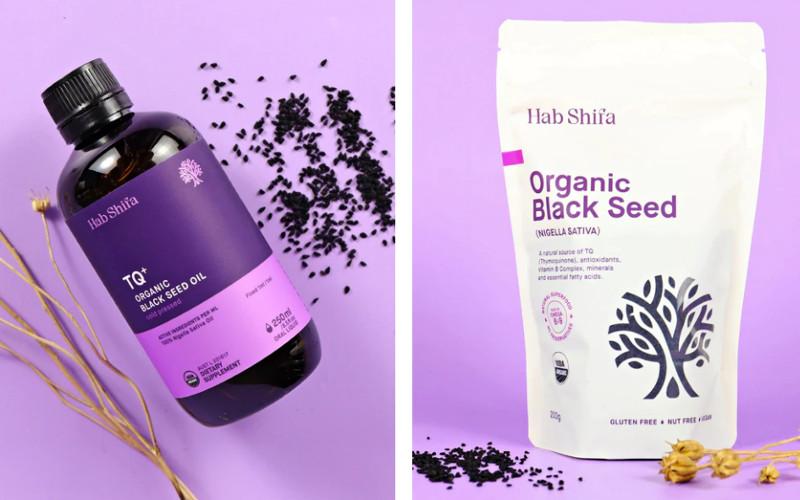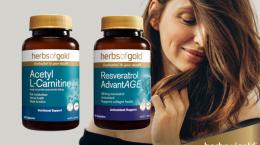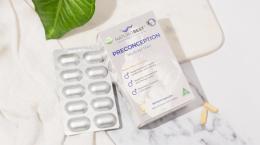What is Black Seed Oil? What is Black Seed Oil used for?

For many of you, the name Flaxseed Oil might ring a bell. But have you ever come across Black Seed Oil? Also known as the seed of Nigella sativa, Black Caraway and Black Cumin, this herbal medicinal oil is reaped full of benefits and even considered a miracle plant due to its plentiful actions and ability to ward off a myriad of ailments.
Benefits of Black Seed Oil:
- Anti-Viral
- Immune Boosting
- Skin, Hair and Nails
- Anti-fungal
- Anti-parasitic
Disclaimer:Always speak with your doctor before taking any action regarding your health. Supplements have a wide range of potential effects and it's important to ensure that they are right for you. This article is not intended to diagnose, treat, or cure any disease. This post is based on general knowledge and does not provide specific medical advice. |
Rich in antioxidants, the active phytochemical compound thymoquinone, is what provides this flowering plant with its potency and substance. Acting as the main player, thymoquinone works to protect immunity, rid bacteria, fungi and viruses whilst also taking centre stage as an anti-allergenic, anti-inflammatory, anti-parasitic, diuretic and gut soother.1 It has also shown to be beneficial for liver health, skin conditions and high blood pressure.
For centuries, Black Seed Oil has been utilised and found amongst ancient civilisations and folklore traditional medicinal practices. Widely used throughout the Middle East, North Africa and Southwest Asia, Black Seed Oil has found its way into many cultural medical regimes.
Over the years, herbal medicine has weaved its way into modern medicine, becoming increasingly popular due to its ancient roots in heritage and tradition. In fact, traditional plant medicine has also been vastly utilised in low resource communities, particularly in developing countries. For those who are unable to invest in allopathic pharmaceuticals, herbal medicines are sole focus due to their easy accessibility, home-made preparatory actions and affordability.2
Whilst acknowledging the traditional methods of those who came before, there seems to be no end to what this wondrous plant can do. It holds great holistic merit when it comes to treating a number of conditions,3 with some beneficial actions highlighted below.
Anti-Viral and Immune Boosting.
As previously mentioned, Black Seed Oil is rich in thymoquinone, an effective substance responsible for its powerful anti-viral and immune boosting properties. Thymoquinone helps to combat inflammatory responses in the body, particularly when it comes to upper respiratory conditions such as asthma, allergic rhinitis and bronchitis.
The active ingredient may help the body to produce more white blood cells, helping them to attack foreign invaders and dispose of them before the virus can cause havoc. By recognizing viruses head on, it can prevent inflammatory chemicals from being released into the bloodstream.
Skin, Hair and Nails.
Throughout the years, Black Seed Oil has been utilised for the treatment of many dermatological conditions. Cosmeceutical formulations such as creams and ointments have been deemed valuable for acne, wounds and burns. Studies have also proven extremely beneficial for inflammatory, painful skin conditions such as eczema and psoriasis. Indeed, a study has suggested Black Seed Oil to be on
Discussions regarding healthy hair growth and Black Seed Oil have also sparked debate. Supposedly the active ingredient thymoquinone works therapeutically when used as a hair rinse. When mixed with olive or coconut oil, Black Seed Oil can be applied and massaged throughout the scalp, helping to restore damaged hair follicles, strengthen roots and repair areas of thinning. It helps to hydrate, targeting dandruff, flaky skin and dry hair.
Anti-fungal and Anti-parasitic.
Black seed oil works as an anti-fungal targeting pathogenic yeasts, subsequently protecting our gut health. Studies have shown that Nigella sativa has had incredible success, particularly against candida albicans.
Whilst candida is not necessarily a bad thing, an overgrowth can cause some unpleasant symptoms and pharmaceutical anti-fungals can sometimes do more harm than good.
Thus, Black Seed Oil may work as a gentler approach when it comes to eliminating over-populated yeasts. Additionally, the ointment of the medicinal plant was also shown to inhibit the inflammatory response to parasitic invasion, proving it to be a wonderful preventative and cleansing agent for body.
How to take and or apply Black Seed Oil?
Black seed oil can be taken both internally and externally. A lot of people choose to use it initially as an inhalant for colds and flus, rather than consuming it whole.
This is because the oil is quite bitter and spicy in nature, and in order to make it more palpable, it may need to be coated with a mixer such as orange juice or honey. However, the health benefits of this medicine far outweigh the pungent taste.
If choosing to take internally, suggestions range from 1 teaspoon to 1 tablespoon per day. Starting with minimal amounts to measure respective tolerance levels is always recommended.
Cautions
- Contraindications are targeted to those on blood pressure and sedative medications as-well as those with blood clotting disorders.
- Black seed oil may also lower blood sugar levels and lower blood pressure and thus, those with diabetes and or hypotension must tread with care / seek advice from a health care practitioner before use.
- Always stop taking herbs two weeks prior to surgery
- Always consult your health care practitioner when it comes to advice on drug interactions and new medicinal regimes.
Disclaimer:Always speak with your doctor before taking any action regarding your health. Supplements have a wide range of potential effects and it's important to ensure that they are right for you. This article is not intended to diagnose, treat, or cure any disease. This post is based on general knowledge and does not provide specific medical advice. |
The information presented in this article is intended to be general in nature. Always seek medical advice from your qualified practitioner before using any supplements or following any information presented.
References
1 Ahmad, A., Husain, A., Mujeeb, M., Khan, S. A., Najmi, A. K., Siddique, N. A., Damanhouri, Z. A., & Anwar, F. (2013). A review on therapeutic potential of Nigella sativa: A miracle herb. Asian Pacific journal of tropical biomedicine, 3(5), 337–352. https://doi.org/10.1016/S2221-1691(13)60075-1
2 Yimer, E.M., Tuem, K.B., Karim, A., Ur-Rehman, N., Anwar, F. (2019). Nigella sativa L. (Black Cumin): A Promising Natural Remedy For A Wide Range of Illnesses. Evidence-Based Complimentary Medicine, 2019, 1528635. http://doi.org/10.1155/2019/1528635
3 Ahmad, A., Husain, A., Mujeeb, M., Khan, S. A., Najmi, A. K., Siddique, N. A., Damanhouri, Z. A., & Anwar, F. (2013). A review on therapeutic potential of Nigella sativa: A miracle herb. Asian Pacific journal of tropical biomedicine, 3(5), 337–352. https://doi.org/10.1016/S2221-1691(13)60075-1
4 Eid, A. M., Elmarzugi, N. A., Abu Ayyash, L. M., Sawafta, M. N., & Daana, H. I. (2017). A Review on the Cosmeceutical and External Applications of Nigella sativa. Journal of tropical medicine, 2017, 7092514. https://doi.org/10.1155/2017/7092514
5 Shokri H. (2016). A review on the inhibitory potential of Nigella sativa against pathogenic and toxigenic fungi. Avicenna journal of phytomedicine, 6(1), 21–33.
6 Yimer, E.M., Tuem, K.B., Karim, A., Ur-Rehman, N., Anwar, F. (2019). Nigella sativa L. (Black Cumin): A Promising Natural Remedy For A Wide Range of Illnesses. Evidence-Based Complimentary Medicine, 2019, 1528635. http://doi.org/10.1155/2019/1528635







